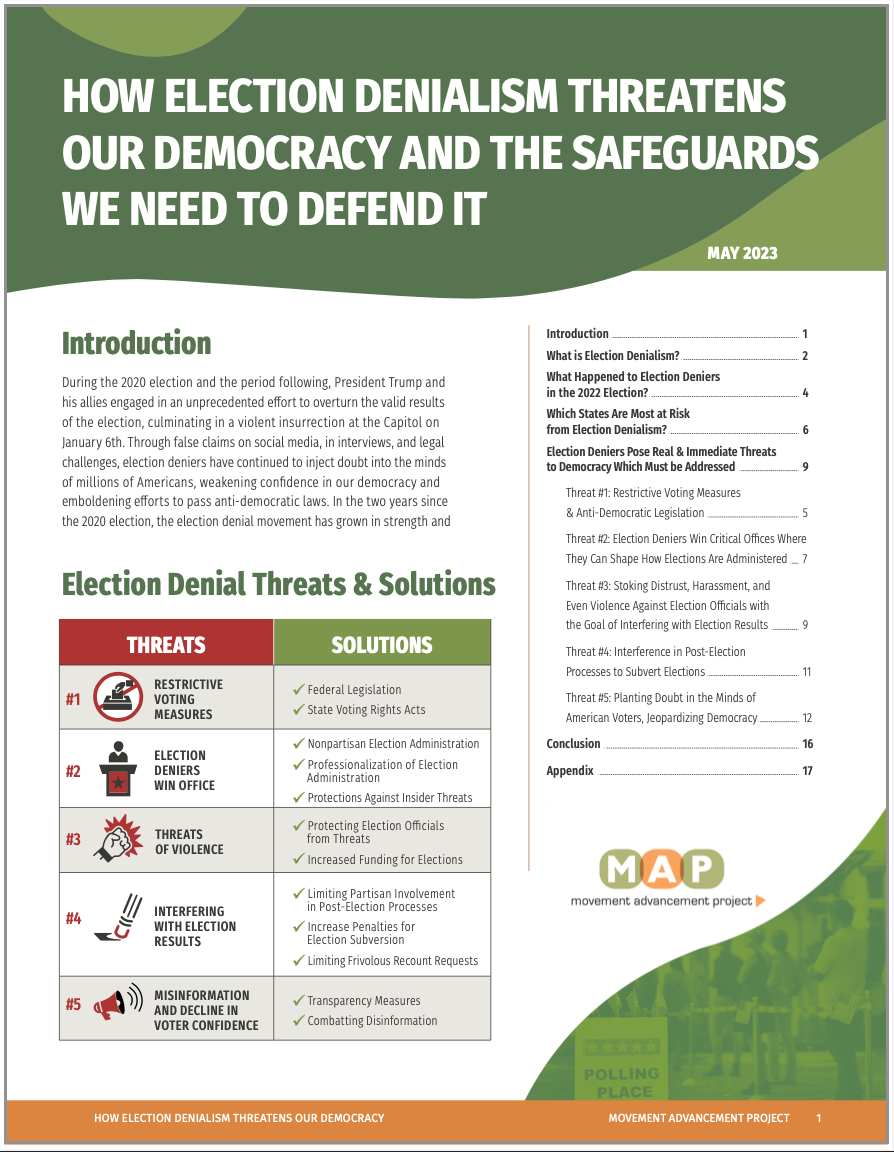"How Election Denialism Threatens Our Democracy and the Safeguards We Need to Defend It"Download Report Appendix: National Election Denial Risk Index, By State (as of April 2023) Download Appendix: National Election Denial Risk Index, By State (as of August 2023) Download File Democracy Map: Laws Protecting Election Officials Against ThreatsView map Democracy Map: Post-Election Audits Required View map Democracy Map: Risk-Limiting AuditsView map Democracy Map: Security of Voting MachinesView map
A new report from MAP,
How Election Denialism Threatens Our Democracy and the Safeguards We Need to Defend It, measures the level of risk to each state posed by election denialism, the resulting threats when the proper safeguards are not in place. The report also offers more than 10 recommendations for ways in which states can protect their elections from election deniers.
The report includes MAP's new
National Election Denial Risk Index, which shows that
more than two in three American voters (157 million voters) live in states with at least a moderate risk of election denialism jeopardizing future elections. Of those, 29 million voters live in high-risk states for election denial.
The
National Election Denial Risk Index is a tool for lawmakers, journalists, and the public that can be used to examine the range of ways that election denialism poses a threat to each state and which policies can strengthen a state’s ability to combat these threats. The Index is a composite of several voting and election policies tracked by the Democracy Maps as well as seven additional policies.
Takeaways from analysis based on the National Election Denial Risk Index:- Only one battleground state from the 2020 election (Michigan) is at lower risk of threats from election denialism, in part due to strong policies like best practice post-election audits and protections against partisan interference in the election certification process.
- Seven battleground states fall in the moderate risk category (Arizona, Florida, Georgia, Nevada, North Carolina, Pennsylvania, and Wisconsin). Battleground states in the last presidential election had slim margins of victory, making policies to defend against election denialism all the more important to ensure our elections are free from interference.
- Only two states fall in the lowest risk category: Colorado and Oregon.
- Virginia has the third lowest risk of election denialism, faring better than California, New York, and Washington.
- Six states fall into the highest risk category for threats posed by election denialism: Alabama, Louisiana, Mississippi, South Dakota, Texas. An estimated 29 million eligible voters live in these states.
The report also outlines five key threats to our democracy that result from election denialism and offers solutions:
- Threat #1: Enacting restrictive voting measures and anti-democratic legislation.
Solutions include passing federal voting rights legislation and state voting rights acts. - Threat #2: Election deniers winning critical offices where they can shape how elections are administered.
Solutions include nonpartisan and professional election administration, as well as protection from insider threats. - Threat #3: Stoking doubt, harassment, and even violence against election officials with the goal of interfering with election results.
Solutions include legislation to specifically protect election officials from threats and increasing funding for elections to ensure security measures and other proper infrastructure. - Threat #4: Interfering in post-election processes to subvert election results.
Solutions include limiting partisan involvement in post-election processes, increasing penalties for election subversion, and limiting frivolous recount requests. - Threat #5: Planting doubt in the minds of American voters which jeopardizes democracy.
Solutions include transparency measures to restore voter confidence and combatting election disinformation.
The report makes clear that action must be taken now at the state and national level. By enacting legislation to protect voting rights, insulating election administration systems from partisan actors, protecting election officials who are acting in good faith from threats, and taking measures to increase voter confidence, our democracy can be protected, preserved, and even further strengthened.
Recommended citation format:
Movement Advancement Project. May 2023.
How Election Denialism Threatens Our Democracy and the Safeguards We Need to Defend It. https://www.mapresearch.org/2023-election-denialism-report.


